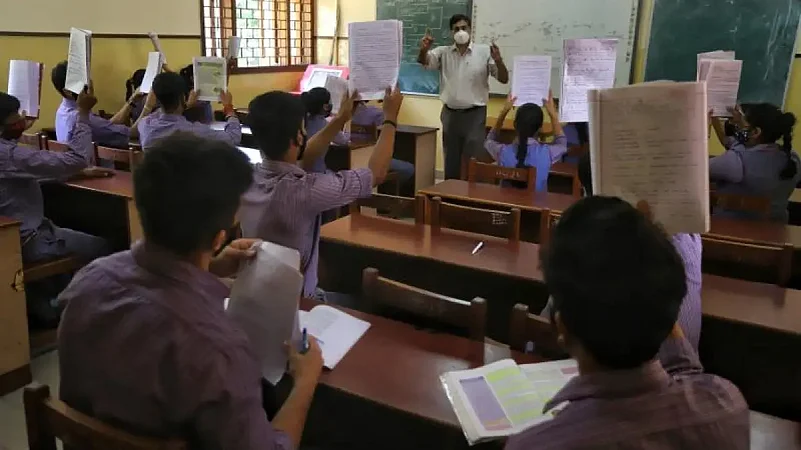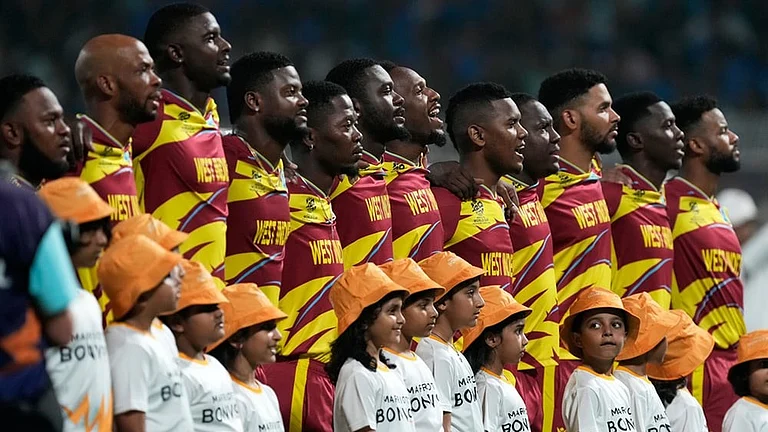The CBSE earlier this week dropped translated verses of Faiz Ahmad Faiz’s poems in NCERT’s class 10th political science textbook from the curriculum which students had been reading for more than 10 years.
The poems, included in the book’s section on “Religion, Communalism and Politics — Communalism, Secular State”, are not the first exclusions from syllabi in recent years. Earlier, Mahasweta Devi’s Draupadi was dropped from the syllabus by Delhi University, which also revised history syllabus a few years back.
The Outlook’s October 11, 2021 issue covered the syllabus revision. Here are some stories from the issues. Click on headlines to read.
In this piece, Chinki Sinha wrote about the many questions she had growing up that her syllabus at the time did not explain.
These questions concerned Draupadi that she watched being disrobed on television, a Dalit named Muniya who used to do cleaning at their house, and an old woman named Gangajali who cared for her grandmother.
She wrote about Muniya, “She would shout and announce her arrival. Her shadow wasn’t good for us, I was told. She was served tea in a cup kept outside the house. She squatted on the floor outside the door. When I asked why we couldn’t give her the porcelain cup, I was told that’s how it was. She was not “us”, and when I asked about “them”, there was just silence.”
She wrote about Gangajali, “When my grandmother died, Gangajali wasn’t a part of the rituals. The one who fed her water with a spoon all those years wasn’t allowed to pour gangajal (holy water) in my dying grandmother’s mouth. Gangajali disappeared. I asked why. They kept silent.”
Caste, gender, women’s movement and citizenship were not part of the syllabus, but it’s not out of our lives. Sinha wrote, “There are many Draupadis around us. There are many injustices, a lot of pain and violence. We see it now. You can take it out of syllabus. You can’t take it out of us. Everything is out there, around us.”
State Terror, Armed Forces And The Story Behind Removal Of 'Draupadi' From DU Syllabus by Snigdhendu Bhattacharya
The Delhi University dropped Mahasweta Devi’s short story Draupadi from its syllabus last year. The story first was published in the leftist literary journal Porichay in 1977 and was included in Mahasweta’s short story collection Agnigarbha in 1978.
In this piece, Bhattacharya wrote how Draupadi has unsettled patriarchy in the decades since its publication. He mentions a play in Manipur, based on the story in which an actor portrayed Draupadi who was sexually abused by a military officer.
“The audience was taken by shock and awe as Heisnam [the actor playing Draupadi] stood stark naked after flinging her last cover, the lower garment phanek, on the general,” wrote Snigdhendu.
While the play was criticised at the time for its use of nudity, it was later said to be prophetic as 12 women posed naked in front of an Assam Rifles unit with a banner reading “Indian Army Rape Us” in protest against the rape and murder of 32-year-old Thangjam Manorama, allegedly by soldiers of the Assam Rifles.
In this piece, Vikas Pathak placed the removal of Mahasweta Devi’s Drauapdi by Delhi University in a broader context in which DU’s earlier revision of its history syllabus and controversy over Kerala’s inclusion of writings by MS Golwalkar and VD. Savarkar in Kannur University syllabus are mentioned.
Pathak noted that RSS’s agenda to “Indianise” education and curriculum finds resonance in UGC’s draft history syllabus.
He further wrote on the shift from left-leaning historians, “If university syllabi over the last few ¬decades had books by scholars who were either Marxist or broadly aligned with the left—DD Kosambi, RS Sharma, DN Jha, Romila Thapar, Irfan Habib, Satish Chandra, Bipan Chandra and Sumit Sarkar were routinely taught in ¬universities like JNU and DU—the new curriculum marks the return of scholars like R.C. Majumdar, Jadunath Sarkar, R.S. Tripathi, Aashirwadi Lal Srivastav and K.A. Nilakantha Sastri. The move away from Marxist readings is clear, though Thapar, Bipan Chandra and Sarkar do find a mention in the new reading list.”






















